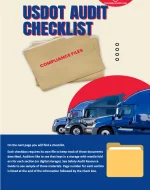How To Get Your Apportioned Plates In Texas
Getting apportioned plates in Texas is the vehicle registration process for your commercial vehicle. Apportioned plates, issued under the International Registration Plan (IRP), allow commercial vehicles to legally travel in multiple jurisdictions without requiring separate plates for each state or province. In this guide, we’ll walk you through the process, explain what apportioned plates are, and detail the additional registrations you’ll need, like the International Fuel Tax Agreement (IFTA). We’ll also provide resources to ensure a smooth process and highlight how we can help.
What Are Apportioned Plates?
Apportioned plates are part of the International Registration Plan (IRP), a reciprocal agreement among U.S. states, the District of Columbia, and Canadian provinces. The IRP ensures that commercial motor vehicles operating in multiple jurisdictions pay their fair share of road use taxes based on miles traveled in each area.
Key Features of Apportioned Plates:
- They are required for vehicles used for transporting goods or passengers across state lines.
- Fees are calculated based on the mileage driven in each jurisdiction.
- They eliminate the need for separate registrations in multiple states or provinces.
For more detailed information, you can visit the official IRP website.
Who Needs Apportioned Plates?
According to IRP and the Federal Motor Carrier Safety Administration (FMCSA), you need apportioned plates if your vehicle:
- Has a gross vehicle weight (GVW) or registered weight over 26,000 pounds, or
- Has three or more axles, regardless of weight, or
- Is used in a combination where the GVW exceeds 26,000 pounds.
If your vehicle operates only within Texas and does not cross state lines, you may not need apportioned plates. However, always confirm your specific requirements with the Texas IRP site.
Documents Required for Apportioned Plates in Texas
Before applying for apportioned plates, gather the following documents to streamline the process:
- Articles of Organization for an LLC: Proof of your business’ legal formation.
- Driver’s License: A valid commercial or standard driver’s license.
- Proof of Residency or Leased Address: This could include utility bills, lease agreements, or other proof of your physical business location in Texas.
- Title for the Vehicle: A copy of your vehicle’s title.
- Proof of Insurance: Ensure it meets Texas minimum liability requirements for commercial vehicles.
- Mileage Records: Documentation of miles traveled in each jurisdiction over the past reporting period.
These documents should be accurate and up-to-date to avoid delays. If you need assistance preparing your documentation, check out our pricing page for support.
Need Help With Your Apportioned Plates?
Get Help Today!
We Can Help You Setup Your Apportioned Registration.
Speak With Our Experienced Permit Professionals That Can Help You Every Step Of The Way.
Call Us Today! Live Agents Are Standing By.
How to Apply for Apportioned Plates in Texas
Here is a quick summary on the steps required to obtain your commercial IRP plates:
- Set Up an IRP Account: Visit the Texas IRP website to register your account.
- Complete the IRP Application: Provide all requested details, including vehicle information, mileage records, and jurisdictional data.
- Submit Supporting Documents: Upload or mail the required documents listed above.
- Pay the Fees: Fees will depend on the jurisdictions you plan to operate in and your vehicle’s mileage.
- Receive Your Plates: Once approved, you’ll receive your apportioned plates and cab cards, which must be carried in your vehicle at all times.
What Is IFTA and Why Do You Need It?
The International Fuel Tax Agreement (IFTA) simplifies fuel tax reporting for vehicles operating in multiple jurisdictions. With IFTA, you file a single quarterly tax return to your base jurisdiction, which then distributes the appropriate taxes to other jurisdictions.
Who Needs IFTA?
You must register for IFTA if your vehicle:
- Has a GVW exceeding 26,000 pounds, or
- Has three or more axles regardless of weight, or
- Operates in multiple jurisdictions.
For more information, visit the official IFTA website or the Texas IFTA website.
How to Register for IFTA in Texas:
- Complete the Application: Visit the Texas IFTA portal to submit your application.
- Provide Documentation: You’ll need proof of your business location, vehicle information, and prior mileage records.
- Pay Fees: Submit the necessary fees based on your fleet’s size and operations.
- File Quarterly Reports: Once registered, ensure timely quarterly filings to remain compliant.
Defining a Commercial Motor Vehicle
The FMCSA defines a commercial motor vehicle as one that:
- Transports passengers or goods for compensation or business purposes, and
- Meets weight or axle requirements (GVW over 26,000 pounds or three or more axles).
For a comprehensive understanding, visit the FMCSA website.
Why Choose Us for Your Apportioned Plate Needs
Navigating the registration process for apportioned plates and IFTA can be challenging. That’s where we come in. Our services include:
- Assisting with IRP and IFTA applications.
- Ensuring your documentation is accurate and complete.
- Providing step-by-step guidance tailored to your business.
Explore our full range of services on our pricing page to see how we can help.
Trucking Authority Services
Our Additional Services:
- MC Number Application: For interstate operations.
- BOC-3 Filing: Mandatory for activating your authority.
- Unified Carrier Registration (UCR): Ensures compliance for interstate carriers.
- Form 2290 Filing: Helps meet IRS Heavy Vehicle Use Tax (HVUT) requirements.
- IFTA & IRP Setup: Simplifies fuel tax reporting.
- Insurance
- Drug & Alcohol Consortium Program
Business Formation Services:
- New Business Setup: Assistance with forming corporations, LLCs, or partnerships tailored to your trucking needs.
State-Specific Permits:
- Texas Intrastate Authority: Obtain necessary permits for in-state operations.
- Texas IFTA Registration: Simplifies fuel tax reporting for Texas-based carriers.
- Texas Apportioned Registration: Facilitates multi-state vehicle registration for commercial vehicles.
Explore all our services here.
Texas IRP DMV Locations (Walk Through Process)
FAQs
What are apportioned plates?
They allow commercial vehicles to operate in multiple jurisdictions without separate registrations.Who needs apportioned plates?
Vehicles exceeding 26,000 pounds GVW, with three or more axles, or used in combination exceeding 26,000 pounds.What documents are required?
Driver’s license, Articles of Organization, proof of residency, title, insurance, and mileage records.How do I register for IRP in Texas?
Set up an account, complete the application, provide documents, and pay fees through the Texas IRP website.What is IFTA?
A tax agreement that simplifies fuel tax reporting for multi-jurisdictional vehicles.Who needs IFTA?
Vehicles with a GVW over 26,000 pounds or three or more axles operating in multiple jurisdictions.What are quarterly IFTA filings?
Reports that detail fuel taxes owed based on mileage and fuel consumption in different jurisdictions.Can you help setup my IRP and IFTA?
Yes, we provide IRP & IFTA account setups. Learn more here.What happens if I don’t get apportioned plates?
Operating without proper registration can lead to fines, penalties, and restricted operations.Can I apply for apportioned plates online?
Yes, Texas allows online registration through their IRP portal once you have already setup an account.







